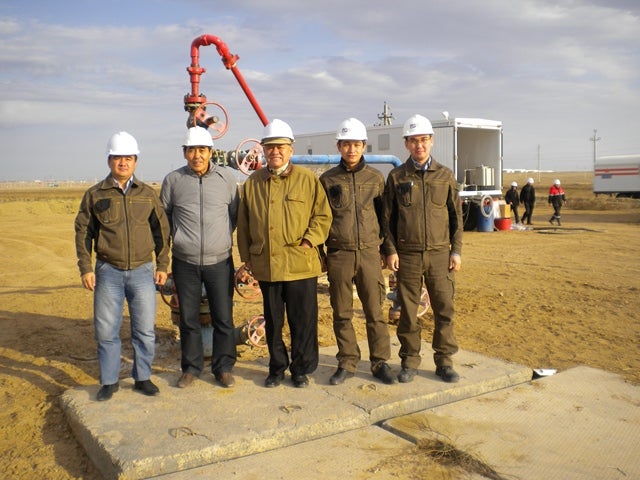 Although innovation has been a hot topic in Kazakhstan for over a decade now, it’s not always easy getting brilliant ideas “from the laboratory to the market.”
Although innovation has been a hot topic in Kazakhstan for over a decade now, it’s not always easy getting brilliant ideas “from the laboratory to the market.”
Kazakh scientists navigate this winding, unpredictable road for years and generally come to the realization that great scientific research is not enough in itself. Too often, they face a lack of support when it comes to applying the results of their scientific research in a useful, practical way.
Fortunately, a team of Kazakh scientists at the Private Entity Institute of Polymer Materials and Technology in Almaty has had a somewhat more positive experience. This team has been working on a truly innovative project: developing a solution to improving the recovery of oil from old oil wells in Kazakhstan.
But why, you might ask?
As oil extraction goes deeper into wells in the ground, oil quantity typically decreases, recovery costs increase, and the economic feasibility declines. Usually, old oil wells have to be sealed until a more cost-effective solution is found. Getting more oil from older wells, therefore, can have a significant economic impact.
It started back in 2005, when a bright idea surfaced to use in Kazakhstani oilfields environmentally-safe polymers to replace traditionally used saline water. Scientific modelling and a proof-of-idea were subsequently undertaken from 2009-2011. The team then carried-out real field tests that required a significant increase in levels of funding and expertise – something that would have been impossible through the standard government-supported channels.
So, how did they do it?
The Almaty team won a grant fund of more than US$1.4 million from the World Bank’s Technology Commercialization Project (TCP), implemented by the Ministry of Education and Science of Kazakhstan. But that’s not all. They also received much-needed technical support that otherwise would not have been available to them.
The grant was accompanied by technical guidance from the International Science and Commercialization Board, along with operational support from the Technology Commercialization Office, assisted by CRDF Global. This comprehensive support enabled the team to quickly take their laboratory results into the field.
 The first results were highly impressive. 14.5 tons of additional oil was extracted from five old wells during an eighteen month period, translating into US$8 million of additional revenue.
The first results were highly impressive. 14.5 tons of additional oil was extracted from five old wells during an eighteen month period, translating into US$8 million of additional revenue.
With additional support from TCO and CRDF Global, potential partners were identified and the first licensing agreement was signed – essentially opening the door to further investments.
This particular project is just one out of sixty six projects supported by the Technology Commercialization Project. The success rate is very high: many of the TCP-supported projects are close to reaching commercialization results by 2015, when the TCP ends, which demonstrates the successful model of funding applied research and engaging private sector investment and participation in innovation.
To take the momentum further and stimulate greater collaboration between industry, science and education, the World Bank has partnered with the Government of Kazakhstan to develop a new Fostering Productive Innovation Project to be launched in early 2016. The idea is to make innovation an integral part of Kazakhstan’s economy and the lives of its citizens.
At the World Bank we are striving to help the country unleash the full potential of its most creative and innovative people – which we hope will ultimately increase the diversification and competitiveness of Kazakhstan’s current oil-based economy.
But you may have ideas too! How do you think we could support Kazakhstan’s transformation into a knowledge economy?


Join the Conversation